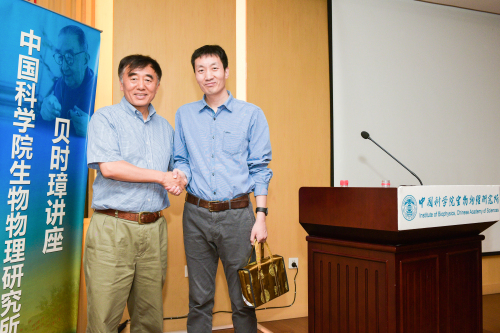Prof. SONG Baoliang from Wuhan University Delivered the BEI Shizhang Lecture
Prof. SONG Baoliang focuses on the research of cholesterol metabolism, regulation and homeostasis. His team has made an important contribution on cholesterol-modified protein, cholesterol intracellular transportation, and cholesterol absorption mechanism studies.
Hedgehog (Hh) had been known as the only cholesterol-modified morphogen playing pivotal roles in development and tumorigenesis. His team performed an unbiased biochemical screen and identified that SMO was covalently modified by cholesterol on the Asp95 (D95) residue through an ester bond. This modification was inhibited by Patched-1 (Ptch1) but enhanced by Hh. The SMO (D95N) mutation, which could not be cholesterol modified, was refractory to Hh-stimulated ciliary localization and failed to activate downstream signaling. Furthermore, homozygous SmoD99N/D99N (the equivalent residue in mouse) knockin mice were embryonic lethal with severe cardiac defects, phenocopying the Smo?/? mice. The results suggested that Hh signaling transduced to SMO through modulating its cholesterylation and provided a therapeutic opportunity to treat Hh-pathway-related cancers by targeting SMO cholesterylation.
In the second part of his presentation, Prof. SONG Baoliang introduced the study on the mechanism of intracellular cholesterol transport. His team established an amphotericin B-based assay enabling a genome-wide shRNA screen for delayed LDL-cholesterol transport and identified 341 hits with particular enrichment of peroxisome genes. Dynamic membrane contacts between peroxisome and lysosome was found in their later study, which are mediated by lysosomal Synaptotagmin VII binding to the lipid PI(4,5)P2 on peroxisomal membrane. LDL-cholesterol enhanced such contacts, and cholesterol was transported from lysosome to peroxisome. Disruption of critical peroxisome genes leaded to cholesterol accumulation in lysosome. Together, these findings revealed an unexpected role of peroxisome in intracellular cholesterol transport. At last, Prof. SONG Baoliangshowed their recently results about the genetics analysis of a low-cholestrol population and cholesterol absorption mechanism study in the last part of his lecture.




